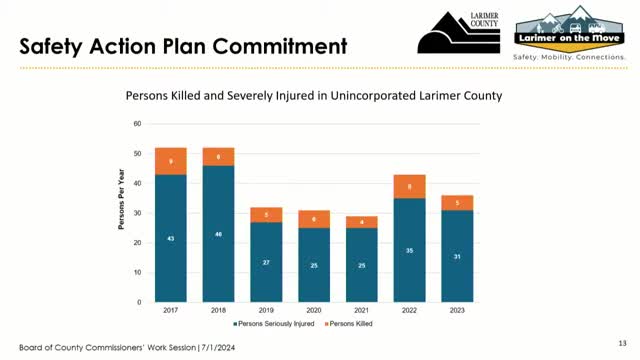Cities commit to zero traffic fatalities by 2030
July 02, 2024 | Larimer County, Colorado

This article was created by AI summarizing key points discussed. AI makes mistakes, so for full details and context, please refer to the video of the full meeting. Please report any errors so we can fix them. Report an error »

In a recent government meeting, officials discussed the pressing issue of road safety, particularly focusing on fatalities and severe injuries resulting from traffic accidents, commonly referred to as KSI (Killed and Seriously Injured) crashes. The conversation highlighted a concerning trend: while there has been a slight improvement in severe crashes since the pandemic, fatalities have remained steady.
The meeting underscored the importance of the Vision Zero initiative, which aims for zero fatalities and severe injuries on the roads. Various local governments, including Denver, Boulder, and Fort Collins, have set ambitious targets for achieving this goal by 2030 or 2032. The initiative emphasizes a holistic approach to road safety, recognizing that human error is inevitable and that the transportation system must be designed to protect individuals from severe outcomes.
Commissioner Stevens raised a critical question regarding accountability, asking if there would be penalties for failing to meet Vision Zero goals. The response indicated that while there are no direct penalties tied to grant funding for not achieving these targets, the initiative's success relies heavily on a concerted effort across multiple sectors, including policy, education, and community engagement.
The discussion also touched on the need for community buy-in, emphasizing that achieving these safety goals requires collective responsibility from both officials and the public. The officials acknowledged the challenges of changing human behavior, particularly in areas such as speeding and driving under the influence, which complicate efforts to enhance road safety.
Overall, the meeting reflected a strong commitment to improving road safety through the Vision Zero framework, with a focus on proactive measures and community involvement to reduce KSI incidents.
The meeting underscored the importance of the Vision Zero initiative, which aims for zero fatalities and severe injuries on the roads. Various local governments, including Denver, Boulder, and Fort Collins, have set ambitious targets for achieving this goal by 2030 or 2032. The initiative emphasizes a holistic approach to road safety, recognizing that human error is inevitable and that the transportation system must be designed to protect individuals from severe outcomes.
Commissioner Stevens raised a critical question regarding accountability, asking if there would be penalties for failing to meet Vision Zero goals. The response indicated that while there are no direct penalties tied to grant funding for not achieving these targets, the initiative's success relies heavily on a concerted effort across multiple sectors, including policy, education, and community engagement.
The discussion also touched on the need for community buy-in, emphasizing that achieving these safety goals requires collective responsibility from both officials and the public. The officials acknowledged the challenges of changing human behavior, particularly in areas such as speeding and driving under the influence, which complicate efforts to enhance road safety.
Overall, the meeting reflected a strong commitment to improving road safety through the Vision Zero framework, with a focus on proactive measures and community involvement to reduce KSI incidents.
View full meeting
This article is based on a recent meeting—watch the full video and explore the complete transcript for deeper insights into the discussion.
View full meeting
